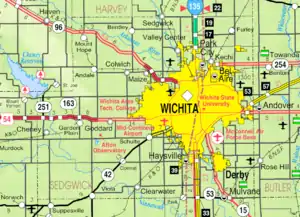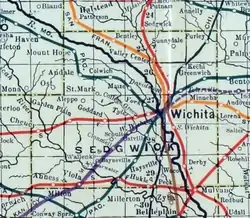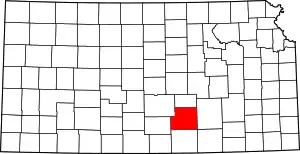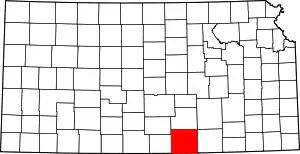Mulvane, Kansas
Mulvane is a city in Sedgwick and Sumner counties in the U.S. state of Kansas and a suburb of Wichita. As of the 2010 census, the city population was 6,111.[7]
Mulvane, Kansas | |
|---|---|
 Location within Sedgwick County and Kansas | |
 KDOT map of Sedgwick County (legend) | |
| Coordinates: 37°28′47″N 97°14′32″W | |
| Country | United States |
| State | Kansas |
| Counties | Sedgwick, Sumner |
| Founded | 1870s |
| Platted | 1879 |
| Incorporated | 1883 |
| Named for | Joab Mulvane |
| Government | |
| • Mayor | Shelly Steadman[1] |
| Area | |
| • Total | 4.47 sq mi (11.58 km2) |
| • Land | 4.46 sq mi (11.56 km2) |
| • Water | 0.01 sq mi (0.02 km2) |
| Elevation | 1,234 ft (376 m) |
| Population | |
| • Total | 6,111 |
| • Estimate (2019)[4] | 6,489 |
| • Density | 1,453.63/sq mi (561.27/km2) |
| Time zone | UTC-6 (CST) |
| • Summer (DST) | UTC-5 (CDT) |
| ZIP code | 67110 |
| Area code | 316 |
| FIPS code | 20-49100 [5] |
| GNIS ID | 0470229 [6] |
| Website | mulvanekansas.com |
History

Mulvane was laid out in 1879[8] at the junction of five Santa Fe rail lines. It is named for Joab R. Mulvane, a railroad official who was instrumental in bringing the Atchison, Topeka, and Santa Fe Railroad to Mulvane.[9]
Geography
Mulvane is located at 37°28′47″N 97°14′32″W (37.479746, -97.242309).[10] According to the United States Census Bureau, the city has a total area of 4.52 square miles (11.71 km2), of which, 4.50 square miles (11.65 km2) is land and 0.02 square miles (0.05 km2) is water.[11]
Mulvane's Main Street follows part of the Sedgwick and Sumner county lines, and the town center is about five miles west of the spot where Sedgwick, Sumner, Butler and Cowley counties meet.
Area events and attractions
- Mulvane Old Settlers Celebration is one of the longest-running community events in Kansas, having started in 1873 (ten years before the town was officially incorporated).
- Mulvane is near the replica of the Golden Gate Bridge built by Larry Richardson, a retired mail carrier, over Cowskin Creek. The bridge, a scale model 150 feet long built at a cost of $5,000 in materials, is a novelty attraction typical of midwestern towns.[12]
- Kansas Star Casino
Demographics
| Historical population | |||
|---|---|---|---|
| Census | Pop. | %± | |
| 1880 | 215 | — | |
| 1890 | 724 | 236.7% | |
| 1900 | 667 | −7.9% | |
| 1910 | 1,084 | 62.5% | |
| 1920 | 1,239 | 14.3% | |
| 1930 | 1,042 | −15.9% | |
| 1940 | 940 | −9.8% | |
| 1950 | 1,387 | 47.6% | |
| 1960 | 2,981 | 114.9% | |
| 1970 | 3,185 | 6.8% | |
| 1980 | 4,254 | 33.6% | |
| 1990 | 4,674 | 9.9% | |
| 2000 | 5,155 | 10.3% | |
| 2010 | 6,111 | 18.5% | |
| 2019 (est.) | 6,489 | [4] | 6.2% |
| U.S. Decennial Census | |||
Mulvane is a part of the Wichita, KS Metropolitan Statistical Area.
2010 census
As of the census[3] of 2010, there were 6,111 people, 2,244 households, and 1,661 families living in the city. The population density was 1,358.0 inhabitants per square mile (524.3/km2). There were 2,357 housing units at an average density of 523.8 per square mile (202.2/km2). The racial makeup of the city was 94.4% White, 0.6% African American, 1.1% Native American, 0.8% Asian, 0.1% Pacific Islander, 0.7% from other races, and 2.4% from two or more races. Hispanic or Latino of any race were 3.5% of the population.
There were 2,244 households, of which 40.4% had children under the age of 18 living with them, 59.3% were married couples living together, 10.5% had a female householder with no husband present, 4.2% had a male householder with no wife present, and 26.0% were non-families. 23.4% of all households were made up of individuals, and 10.5% had someone living alone who was 65 years of age or older. The average household size was 2.70 and the average family size was 3.18.
The median age in the city was 35.1 years. 30.4% of residents were under the age of 18; 6.9% were between the ages of 18 and 24; 25.5% were from 25 to 44; 24.2% were from 45 to 64; and 13.1% were 65 years of age or older. The gender makeup of the city was 48.0% male and 52.0% female.
2000 census
As of the census[5] of 2000, there were 5,155 people, 1,896 households, and 1,444 families living in the city. The population density was 2,261.1 people per square mile (873.0/km2). There were 1,963 housing units at an average density of 861.0 per square mile (332.4/km2). The racial makeup of the city was 96.39% White, 0.17% African American, 0.99% Native American, 0.29% Asian, 0.06% Pacific Islander, 0.60% from other races, and 1.49% from two or more races. Hispanic or Latino of any race were 2.58% of the population.
There were 1,896 households, of which 41.0% had children under the age of 18 living with them, 63.0% were married couples living together, 9.3% had a female householder with no husband present, and 23.8% were non-families. 21.0% of all households were made up of individuals, and 9.1% had someone living alone who was 65 years of age or older. The average household size was 2.69 and the average family size was 3.14.
In the city, the population was spread out, with 30.4% under the age of 18, 8.4% from 18 to 24, 28.8% from 25 to 44, 20.7% from 45 to 64, and 11.7% were 65 years of age or older. The median age was 34 years. For every 100 females, there were 93.1 males. For every 100 females age 18 and over, there were 89.8 males.
The median income for a household in the city was $46,923, and the median income for a family was $56,285. Males had a median income of $39,732 versus $26,797 for females. The per capita income for the city was $19,523. About 2.1% of families and 3.4% of the population were below the poverty line, including 4.0% of those under age 18 and 1.6% of those age 65 or over.
Education
Primary and secondary
The community is served by Mulvane USD 263 public school district. Munson Primary School teaches grades pre-kindergarten through 2nd grade, Mulvane Grade School teaches 3rd grade-5th grade while Mulvane Middle School teaches 6th through 8th, and Mulvane High School teaches 9th though 12th.
Colleges and universities
Cowley County Community College operates a satellite campus within city limits.
Notable people
- Laura Cobb, United States Navy nurse during World War II
- Dennis Franchione, college football coach.
References
- "Mayor's Office / Mulvane, Kansas". mulvanekansas.com. Retrieved December 27, 2019.
- "2019 U.S. Gazetteer Files". United States Census Bureau. Retrieved July 24, 2020.
- "U.S. Census website". United States Census Bureau. Retrieved 2012-07-06.
- "Population and Housing Unit Estimates". United States Census Bureau. May 24, 2020. Retrieved May 27, 2020.
- "U.S. Census website". United States Census Bureau. Retrieved 2008-01-31.
- "US Board on Geographic Names". United States Geological Survey. 2007-10-25. Retrieved 2008-01-31.
- "2010 City Population and Housing Occupancy Status". U.S. Census Bureau. Retrieved March 6, 2011.
- Blackmar, Frank Wilson (1912). Kansas: A Cyclopedia of State History, Volume 2. Standard Publishing Company. pp. 332.
- Bentley, Orsemus Hills (1910). History of Wichita and Sedgwick County, Kansas: Past and Present. Windmill Publications. p. 637.
- "US Gazetteer files: 2010, 2000, and 1990". United States Census Bureau. 2011-02-12. Retrieved 2011-04-23.
- "US Gazetteer files 2010". United States Census Bureau. Archived from the original on 2012-01-25. Retrieved 2012-07-06.
- "A Golden Gate Fantasy on the Kansas Prairie" article by A.G. Suleberger in The New York Times September 15, 2010, accessed September 16, 2010
Further reading
External links
| Wikimedia Commons has media related to Mulvane, Kansas. |
- City of Mulvane
- Mulvane - Directory of Public Officials
- Larry Richardson - Replica of Golden Gate Bridge on YouTube, from Hatteberg's People on KAKE TV news
- Mulvane City Map, KDOT


